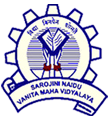
Sarojini Naidu Vanita Maha Vidyalaya
NAAC Accredited 3rd Cycle
(Sponsored & Managed jointly by Osmania Graduates’Association and Exhibition Society)
(Exhibition Grounds, Nampally, Hyderabad )

NAAC Accredited 3rd Cycle
(Sponsored & Managed jointly by Osmania Graduates’Association and Exhibition Society)
(Exhibition Grounds, Nampally, Hyderabad )
Department of Botany-PG
Sarojini Naidu Vanita MahaVidyalaya has been setting records in the arena of education since its inception in 1957. The degree section of the college got its affiliation in 1962 and started intermediate in 1970. The post-graduate course i.e. MSc. Botany was started in 1991.
The department’s three faculty members have served the institution as principals of the college. Three faculty members received best teacher awards from State government. The department of Botany has organized refresher course, national and international seminars and conferences. A refresher course in collaboration with AP State Council of Higher Education and University Grants Commission was organized in 1993. An international symposium on Biodiversity and Sustainable Development was conducted in 1994. The research laboratory of the Department is a recognized Research Centre since 1994. A national conference on Aerobiology was organized in 2002, National Seminar on Current Trends in Medicinal Botany in the Era of Biotechnology” in 2004, a national conference on Modern Trends in Plant Taxonomy and Biodiversity Conservation for safeguarding Medicinal Plant Wealth was held in 2008 and XIX APSI Scientist meet and UGC sponsored national conference on Plant Biotechnology towards nutrition and Nutraceutical Potential was organized in Collaboration with Academy of Plant Sciences, Muzaffarnagar in 2010. A seminar on Biodiversity and its Conservation was organized in collaboration with Telangana Biodiversity Board in 2017.
The Department was sanctioned major and minor research projects from UGC. Six research scholars were awarded PhD’s and one research scholar is pursuing her research. The faculty of the Department publishes research papers in the reputed National and International journals. The faculty and research scholars are recipients of many awards and credentials in the research field.
The department has 10 staff members of which 3 are PhDs and 1 pursuing PhD.
Offers B.Z.C., at undergraduate level, has 5 well equipped laboratories, museum, herbarium room, departmental library and a research laboratory. Faculty of department is engaged in organizing student activities like seminars, quizzes, tree plantations, botanical tours, horticultural shows and workshops under the preview of ECO club. Also organizes competitions for the students in essay writing, elocution, quiz and power point presentations so as to improve their subject writing and communication skills.
To promote the culture of learning by educating students in the basics of plant sciences and its related components and evolving advancements that will serve science and nation in the 21st century.
To expand academic cooperation by offering new courses and upgrading programs to a wider spectrum of students and researchers.
To conduct innovative research, teaching, and outreach on the patterns and the process of life with a focus on plants and their environment.
Training the students in the latest aspects of Horticulture and Hydroponics.
To equip the students with the basic skills in identifying and labelling different plants.
To impart quality education in the field of Botany enabling our students confidently sustain in the world.
To sensitize the students towards the need for keeping the environment clean and conserve our natural resources.
To apply conventional as well as non-conventional tools to understand plant processes development of human resource with hands on expertise in the frontier areas of plant sciences.
ENVIRONMENTAL POLLUTION AND PROTECTION:
Different kinds of pollution and their effects on ecosystem, primary treatment (industrial treatment) secondary treatment (biological treatment) and waste stabilization, bioremediation, phytoremediation, and environmental protection Act 1986.
The above topics enable the students to understand the causes and effects of pollution and its management which is of utmost important issue concerned, because of the seriousness of the problem. Bioremediation knowledge helps them to apply for industrial jobs and pollution control board projects.
HORTICULTURE:
Different propagation methods of horticulture plants along with nutrient management, mass production of horticulture plants, plant breeding, transgenic technology, grafting technology, simple horticultural practices to grafting to different ornamental and plantation crops will be familiar to the students.
This subject provides the students to have an opportunity to start a nursery or raise new grafting plants for commercial exploitation.
BIODIVERSITY AND TAXONOMY OF ANGIOSPERMS:
Magnitude and distribution of biodiversity-inventorying and monitoring, characterization of biodiversity, biodiversity of different categories of economically important plants, conservation of biodiversity.
Biodiversity is the growing offshoot of botany deals with study of bio-resources for better utilization and conservation. State and district biodiversity boards provide placement opportunities for the students.
CULTIVATION AND POST-HARVEST TECHNOLOGY OF MEDICINAL PLANTS:
Cultivation practices of important medicinal and aromatic plants, post-harvest management-drying, distillation, packing, storage etc.
Financial aspects of medicinal plant cultivation, subsidies, IPR-patterns, practical knowledge of cultivation of medicinal plants provides a better chance to the students to work in pharmaceutical companies in their research programmes.
PHARMACOGNOSY:
Types of crude drugs, sources of crude drugs, evaluation, adulteration etc various drug constituents-phytochemical analysis, powder analysis of different drugs are conducted in practicals.
With the increase in demand and popularity of herbal drugs in the medicine enhanced the scope of pharmacognosy which is earlier a subject of pharmacy students.